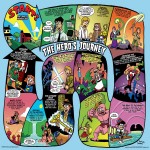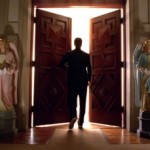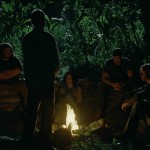 When you’ve seen as many movies as I have, you begin to see that they all follow a certain pattern. This is true not just of movies, but of all great stories ranging from those found in classic mythology and literature to modern TV series and video games. Joseph Campbell called it the monomyth or hero’s journey. It’s basically a series of steps that the protagonist must go through during the course of his or her adventure. In addition to this, there are also a number of spiritual principles that often find their way into storytelling. By combining these principles with the monomyth, you can pretty much figure out where just about any story is headed. While this skill has proven to be incredibly annoying to my wife, it’s come in very handy for me. Not because I’ve continually annoyed her with my usually correct movie and TV show predictions, but because I’ve noticed that these storytelling rules apply to more than just fictitious stories. They also apply to real life.
When you’ve seen as many movies as I have, you begin to see that they all follow a certain pattern. This is true not just of movies, but of all great stories ranging from those found in classic mythology and literature to modern TV series and video games. Joseph Campbell called it the monomyth or hero’s journey. It’s basically a series of steps that the protagonist must go through during the course of his or her adventure. In addition to this, there are also a number of spiritual principles that often find their way into storytelling. By combining these principles with the monomyth, you can pretty much figure out where just about any story is headed. While this skill has proven to be incredibly annoying to my wife, it’s come in very handy for me. Not because I’ve continually annoyed her with my usually correct movie and TV show predictions, but because I’ve noticed that these storytelling rules apply to more than just fictitious stories. They also apply to real life.
 Ah, the enlightened life! A life where the superficial trappings of the material world have lost their luster. Where greasy, fried, and fatty foods are no longer tempting. Where meditation, sharing, and an appreciation of the beauty of nature provide all the fulfillment one needs for true happiness. And yet, considering how healthy, content, and self-fulfilled spiritual people claim to be, why are they plagued with so many health, wealth, and happiness issues? Is poverty a requirement of enlightenment? Is self-indulgence selfish? Is self-love a sign of an inflated ego? The irony is that most spiritual people are just as egotistical as materialistic people—perhaps even more so since they believe themselves to be so far above everyone else. Sacrifice and ascetic behavior do not make one spiritual. Denying the material for the sake of the spirit misses the big picture. To be truly fulfilled, one needs to embrace both of these worlds, creating more than a holy life, but a wholly life.
Ah, the enlightened life! A life where the superficial trappings of the material world have lost their luster. Where greasy, fried, and fatty foods are no longer tempting. Where meditation, sharing, and an appreciation of the beauty of nature provide all the fulfillment one needs for true happiness. And yet, considering how healthy, content, and self-fulfilled spiritual people claim to be, why are they plagued with so many health, wealth, and happiness issues? Is poverty a requirement of enlightenment? Is self-indulgence selfish? Is self-love a sign of an inflated ego? The irony is that most spiritual people are just as egotistical as materialistic people—perhaps even more so since they believe themselves to be so far above everyone else. Sacrifice and ascetic behavior do not make one spiritual. Denying the material for the sake of the spirit misses the big picture. To be truly fulfilled, one needs to embrace both of these worlds, creating more than a holy life, but a wholly life.
 You’ve seen it hundreds of times. Some guy is being interviewed by the local news after he helped prevent some crime or rescued someone in distress. The reporter asks, “Do you consider yourself a hero?” Apparently, this question must be asked in order to test whether or not said person is in fact a hero. According to local news rules of heroism, the man is only a hero, if and only if, he claims to not be one. Most people, knowing this rule, go on to say that they don’t consider themselves to be a hero because they just did what anyone in their situation would’ve done. The reporter then cuts back to the anchorpeople who disagree with the man’s assessment. Feeling that the hero test was passed, they comment about what a true hero the man is while a colorful “local hero” graphic displays besides them. Personally though, I agree with the guy. He’s not a hero.
You’ve seen it hundreds of times. Some guy is being interviewed by the local news after he helped prevent some crime or rescued someone in distress. The reporter asks, “Do you consider yourself a hero?” Apparently, this question must be asked in order to test whether or not said person is in fact a hero. According to local news rules of heroism, the man is only a hero, if and only if, he claims to not be one. Most people, knowing this rule, go on to say that they don’t consider themselves to be a hero because they just did what anyone in their situation would’ve done. The reporter then cuts back to the anchorpeople who disagree with the man’s assessment. Feeling that the hero test was passed, they comment about what a true hero the man is while a colorful “local hero” graphic displays besides them. Personally though, I agree with the guy. He’s not a hero.
 By now you have no doubt heard that according to astronomers and anthropologists, December 21, 2012 correlates to the “end” of the Mayan calendar. And, despite having repeatedly heard about this for many, many years now, it is also very probable that you still have no idea exactly what this means. The reason is because it’s very complicated. To even begin to understand it you need to look to the Mayan myths of the Sacred Tree and understand their incredibly complex Long Count calendar of tuns, k’atuns, and b’aktuns as well as their concepts of the Great Cycle, the Great Great Cycle, and cycles within cycles. You’d also need to understand astronomical occurrences involving the precession of the equinoxes and the conjunction of the sun at the intersection of the plane of the ecliptic and the Milky Way. You can do all that, or, you can simply read my interpretation of this summer’s Green Lantern movie, which shares the same message as the Mayan mythology.
By now you have no doubt heard that according to astronomers and anthropologists, December 21, 2012 correlates to the “end” of the Mayan calendar. And, despite having repeatedly heard about this for many, many years now, it is also very probable that you still have no idea exactly what this means. The reason is because it’s very complicated. To even begin to understand it you need to look to the Mayan myths of the Sacred Tree and understand their incredibly complex Long Count calendar of tuns, k’atuns, and b’aktuns as well as their concepts of the Great Cycle, the Great Great Cycle, and cycles within cycles. You’d also need to understand astronomical occurrences involving the precession of the equinoxes and the conjunction of the sun at the intersection of the plane of the ecliptic and the Milky Way. You can do all that, or, you can simply read my interpretation of this summer’s Green Lantern movie, which shares the same message as the Mayan mythology.
 Lost is dead. Long live Lost. And so it ends, in much the same way it began—with a close-up of Jack’s eye, staring straight up past the tall stalks of bamboo that circled the sky above. This time however, that eye would close, and with it, our six-season journey that took us right back to where we started—with questions about a mysterious show that seemed to parallel the mysteries of life. For some, the journey was far more compelling than the destination. For others, it was the perfect resolution and they can walk away feeling fulfilled. Whatever you thought about the conclusion, the one thing most viewers can agree on is that the show challenged us to think in ways we might not have otherwise. In short, Lost was a real trip. And what a long, strange trip it’s been.
Lost is dead. Long live Lost. And so it ends, in much the same way it began—with a close-up of Jack’s eye, staring straight up past the tall stalks of bamboo that circled the sky above. This time however, that eye would close, and with it, our six-season journey that took us right back to where we started—with questions about a mysterious show that seemed to parallel the mysteries of life. For some, the journey was far more compelling than the destination. For others, it was the perfect resolution and they can walk away feeling fulfilled. Whatever you thought about the conclusion, the one thing most viewers can agree on is that the show challenged us to think in ways we might not have otherwise. In short, Lost was a real trip. And what a long, strange trip it’s been.
 In the penultimate episode of Lost, “What They Died For,” Jacob tells the surviving Losties why he chose them as candidates: “I chose you because you were all alone. You were all looking for something that you couldn’t find out there. I chose you because you needed this place as much as it needed you.” This explanation really resonated with me, on one hand because it provided a mythologically sound answer to the main question I’ve always had about Lost: why do all these characters have major issues? And having that answer provided the other reason I really liked the explanation: I immediately understood that while Jacob was addressing the remaining candidates, he was really speaking to us.
In the penultimate episode of Lost, “What They Died For,” Jacob tells the surviving Losties why he chose them as candidates: “I chose you because you were all alone. You were all looking for something that you couldn’t find out there. I chose you because you needed this place as much as it needed you.” This explanation really resonated with me, on one hand because it provided a mythologically sound answer to the main question I’ve always had about Lost: why do all these characters have major issues? And having that answer provided the other reason I really liked the explanation: I immediately understood that while Jacob was addressing the remaining candidates, he was really speaking to us.
 In “Across the Sea,” Lost finally gives us the origins story for Jacob and the Man In Black. The episode was pure, 100% mythology. Those who watched the episode based on the surface story alone were probably disappointed. Let’s face it, taken literally, myths are silly: talking snakes, little boys defeating giants, jealous gods, immaculate conceptions, mortals with superpowers, a sword stuck in a stone, the Force, Never Never Land, Wonderland, Oz, the Matrix, the Island. On the surface, all myths seem like children’s stories. It’s only when we dig deeper that we find the truth worthy of a wise old soul—a soul that knows where it really came from.
In “Across the Sea,” Lost finally gives us the origins story for Jacob and the Man In Black. The episode was pure, 100% mythology. Those who watched the episode based on the surface story alone were probably disappointed. Let’s face it, taken literally, myths are silly: talking snakes, little boys defeating giants, jealous gods, immaculate conceptions, mortals with superpowers, a sword stuck in a stone, the Force, Never Never Land, Wonderland, Oz, the Matrix, the Island. On the surface, all myths seem like children’s stories. It’s only when we dig deeper that we find the truth worthy of a wise old soul—a soul that knows where it really came from.
 Wanna know why the Man In Black is really trapped on the island? It’s not because he’s malevolence, evil, or darkness, and it’s not because Jacob wouldn’t let him leave. It’s because he hasn’t overcome his issues. And what are his issues? Up to now, all we know is that he seems to be terribly frightened of adolescent boys. Hopefully, we’ll get a better answer next week, but as ridiculous as this might sound, I actually think there may be something to it.
Wanna know why the Man In Black is really trapped on the island? It’s not because he’s malevolence, evil, or darkness, and it’s not because Jacob wouldn’t let him leave. It’s because he hasn’t overcome his issues. And what are his issues? Up to now, all we know is that he seems to be terribly frightened of adolescent boys. Hopefully, we’ll get a better answer next week, but as ridiculous as this might sound, I actually think there may be something to it.
 In “Ab Aeterno,” Richard Alpert loses his faith after discovering that the plan he’s dedicated so much of his life to, may in fact, not exist. From the very same episode, some Lost fans began feeling the same. For six years, Lost viewers with an insatiable hunger for answers have anxiously waited to find out what the mysterious island actually is. At the writer’s strike a couple years ago, Carlton Cuse held up a picket sign that read: “Do You Want To Know What The Island Is??” Thousands of fans have dreamed up imaginative theories, all in an attempt to solve the show’s complex riddle. And now at last we have our answer! According to Jacob himself, the island is…A CORK!!! (crickets)
In “Ab Aeterno,” Richard Alpert loses his faith after discovering that the plan he’s dedicated so much of his life to, may in fact, not exist. From the very same episode, some Lost fans began feeling the same. For six years, Lost viewers with an insatiable hunger for answers have anxiously waited to find out what the mysterious island actually is. At the writer’s strike a couple years ago, Carlton Cuse held up a picket sign that read: “Do You Want To Know What The Island Is??” Thousands of fans have dreamed up imaginative theories, all in an attempt to solve the show’s complex riddle. And now at last we have our answer! According to Jacob himself, the island is…A CORK!!! (crickets)
 For many of us, our lives don’t work out the way we planned. But that doesn’t mean that there isn’t a plan. It’s very apropos that Lost’s “Dr. Linus” episode was named for a teacher since it taught us some very valuable lessons about who we are and what our purpose here may be. In other words, it really was all about you.
For many of us, our lives don’t work out the way we planned. But that doesn’t mean that there isn’t a plan. It’s very apropos that Lost’s “Dr. Linus” episode was named for a teacher since it taught us some very valuable lessons about who we are and what our purpose here may be. In other words, it really was all about you.
 When you’ve seen as many movies as I have, you begin to see that they all follow a certain pattern. This is true not just of movies, but of all great stories ranging from those found in classic mythology and literature to modern TV series and video games. Joseph Campbell called it the monomyth or hero’s journey. It’s basically a series of steps that the protagonist must go through during the course of his or her adventure. In addition to this, there are also a number of spiritual principles that often find their way into storytelling. By combining these principles with the monomyth, you can pretty much figure out where just about any story is headed. While this skill has proven to be incredibly annoying to my wife, it’s come in very handy for me. Not because I’ve continually annoyed her with my usually correct movie and TV show predictions, but because I’ve noticed that these storytelling rules apply to more than just fictitious stories. They also apply to real life.
When you’ve seen as many movies as I have, you begin to see that they all follow a certain pattern. This is true not just of movies, but of all great stories ranging from those found in classic mythology and literature to modern TV series and video games. Joseph Campbell called it the monomyth or hero’s journey. It’s basically a series of steps that the protagonist must go through during the course of his or her adventure. In addition to this, there are also a number of spiritual principles that often find their way into storytelling. By combining these principles with the monomyth, you can pretty much figure out where just about any story is headed. While this skill has proven to be incredibly annoying to my wife, it’s come in very handy for me. Not because I’ve continually annoyed her with my usually correct movie and TV show predictions, but because I’ve noticed that these storytelling rules apply to more than just fictitious stories. They also apply to real life.










